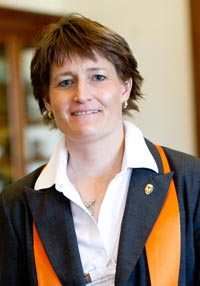In the Right Place at the Right Time

Steadman has been CPR certified for 20 years, and has only had to use it once.
The lives of two athletic trainers and a photographer changed in less than five minutes during a recent local high school football playoff game.
Natalie Steadman, MAT, ATC, LAT, PT, assistant professor in the School of Allied Health Sciences’ Master of Athletic Training Program, and Brittany Sukala, a master’s of athletic training student, were providing athletic training coverage as the Petersburg Buffaloes took on the Ropes Eagles under the Friday night lights in Anton.
In the Blink of an Eye
During the last few minutes of the game, Steadman noticed an acquaintance of hers collapse on the sidelines. The 47-year-old photographer had suffered a cardiac arrhythmia that caused his heart to stop beating.
“All of a sudden, everyone and I mean everyone starts yelling my name,” Steadman said, “and the crowd parted and I saw this man laying face down in the grass.”
Littlefield native Steadman, who has been CPR certified for years, ran to the other end of the football field where the man lay and flew into action.
“I’ve worried for 20 years how I would respond to a situation like this,” Steadman said. “I’ve been CPR certified and taught classes for many years but I’ve always wondered if I would freeze, or if things would just kick in.”
Fortunately, they kicked in.
The man didn’t have a pulse, so Steadman used an Automated External Defibrillator (AED) to shock his heart back into rhythm.
The Moment of Truth
After about 50 to 60 chest compressions, the man’s eyelids flickered and he opened his eyes, Steadman said. She and Sukala, along with members of the Littlefield EMS crew, put the man on a spine board and loaded him into an ambulance bound for UMC Health System in Lubbock.
“I’m just glad I was in the right place, at the right time, with the right equipment, and he had a condition that could be helped,” Steadman said. “You do what you have to do to try to save someone’s life.”
The man is alive and doing well after having an internal defibrillator implanted.
Steadman said although there was a positive outcome, the emergency has permanently changed her outlook on life.
“It makes you stop a take a hard look at life and put things in proper perspective,” Steadman said. “Somehow, losing the football game that night didn’t really matter.”
Related Stories
Celebrating Veterans: TTUHSC’s General Martin Clay’s Legacy of Service and Leadership
From his initial enlistment in the Army National Guard 36 years ago to his leadership in military and civilian health care management roles, Major General Martin Clay’s career has been shaped by adaptability, mission focus and service to others.
Texas Tech University Health Sciences Center School of Nursing Named Best Accelerated Bachelor of Science in Nursing Program in Texas
The TTUHSC School of Nursing Accelerated Bachelor of Science in Nursing (BSN) program has been ranked the No. 1 accelerated nursing program in Texas by RegisteredNursing.org.
TTUHSC Names New Regional Dean for the School of Nursing
Louise Rice, DNP, RN, has been named regional dean of the TTUHSC School of Nursing on the Amarillo campus.
Recent Stories
National Academy of Inventors Names TTUHSC Faculty Senior Members
The National Academy of Inventors (NAI) has designated two current and one former TTUHSC faculty researchers as Senior Members.
The John Wayne Cancer Foundation Surgical Oncology Fellowship Program at Texas Tech University Health Sciences Center Announced
TTUHSC is collaborating with the John Wayne Cancer Foundation and has established the Big Cure Endowment, which supports the university’s efforts to reduce cancer incidence and increase survivability of people in rural and underserved areas.
TTUHSC Receives $1 Million Gift from Amarillo National Bank to Expand and Enhance Pediatric Care in the Panhandle
TTUHSC School of Medicine leaders accepted a $1 million philanthropic gift from Amarillo National Bank on Tuesday (Feb. 10), marking a transformational investment in pediatric care for the Texas Panhandle.
